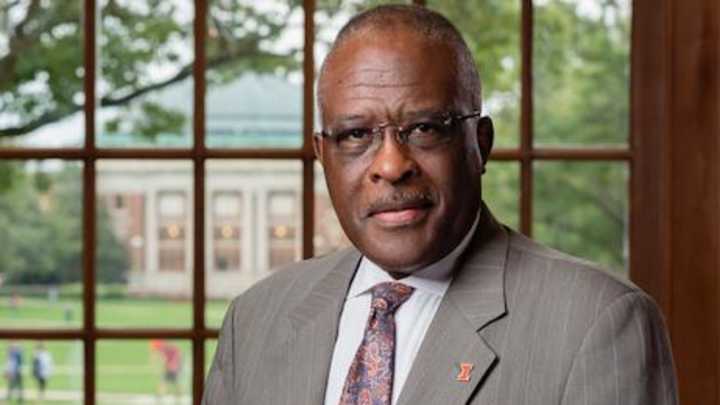Illinois Chancellor "in absolute agreement" To End Big Ten's Fall Sports Calendar

CHAMPAIGN, Ill. -- In his first media appearance since the shutdown of the Big Ten fall sports calendar, the University of Illinois chancellor is standing firm with his decision.
Robert Jones, who has been the chancellor at the University of Illinois since 2016, said in an interview with Chicago television anchor Ryan Baker that he was “in absolute agreement” with his colleagues on the 14-member Big Ten Council of Presidents and Chancellors.
University of Illinois Chancellor Dr. Robert Jones, defending the @bigten decision to postpone fall sports, including the college football season..due to #coronavirus concerns with student-athletes. @cbschicago @Illinois_Alma pic.twitter.com/Q9m5mOej64
— Ryan Baker (@RyanBakerMedia) August 21, 2020
Jones was who voted on behalf of Illinois in the meeting referenced in the open letter published Wednesday from Big Ten Conference commissioner Kevin Warren.
Jones was scheduled to discuss the decision by the Big Ten COP/C via a Zoom press conference on Aug. 12, but 15 minutes prior to the call, a team spokesperson said Jones had to cancel due to travel plans. Jones never rescheduled his media appearance and several media outlets have been denied an opportunity to speak with Jones either one-on-one or in a group setting by the university’s communication office.
Baker, an alum of the U of I, is the weekday morning news anchor at CBS 2 in Chicago and his claim to fame while an undergraduate student is being a basketball manager for the 1988-89 Illini team that reached the Final Four.
The U of I chancellor addressed with Baker the public relations nightmare of a rollout of the decision including the strange timing of announcing the postponement less than a week after promoting a 10-game conference-only football schedule.
“I can tell you for all of us, and I hope people understand, that this was not an easy decision," Jones told CBS 2 Chicago. "Because lest they forget, they had rolled out the schedule about a week before with what the season was going to look like. So this is not something that we were planning in advance to make this ultimate decision. But in the back of our minds, we always knew this was a possibility."
Big Ten Commissioner Kevin Warren explained the decision to postpone fall sports in 2020: pic.twitter.com/NnCXQmGEZS
— Big Ten Network (@BigTenNetwork) August 11, 2020
Jones specifically brought up concerns relied on him and his COP/C colleagues by medical experts on the Big Ten Conference’s COVID-19 task force about myocarditis, an inflammation of the heart muscle, as a key uncertainty.
"We made it very, very clear that testing, rigorous testing, was an absolute requirement for us to begin any kind of fall sports season, including football," Jones said. "But you also are maybe aware of the issue of myocarditis, the heart muscle disease that is an outgrowth of COVID-19 that seems to be more prevalent among student-athletes particularly those that are involved in rigorous kinds of sports."
Jones gave a brief explanation for his university’s decision to proceed with on-campus, in-person classes and allowing students to reside on campus until Thanksgiving break during the fall semester but shutting down sports.
"When you add many other factors that are associated with this, it’s hard to keep athletes in a bubble," Jones said. "It’s not like opening up the university, where you can do social distance. It’s a little hard to do social distancing in contact sports."
According to reports from the Milwaukee Journal-Sentinel and Indiana’s 247Sports.com affiliate site, the Big Ten is working on plans plans to resume football in the winter inside NFL dome stadiums across the Midwest.
"When you add all those factors together, we made a tough but I believe the right decision to delay or postpone the fall sports," Jones said. "We’re not saying we won’t do them at all. And we would do our best to bring the fall sports that have been postponed in the spring — only if we can figure out, as you indicated, the ability to do it safely. We will have time to know more about all of these issues that led us to this decision, including the many unknown issues regarding myocarditis as well.”
